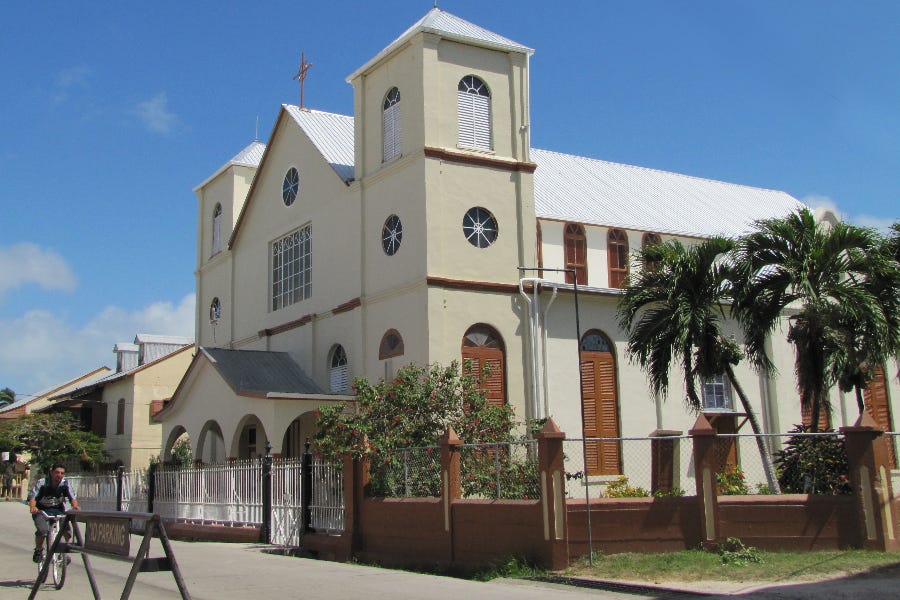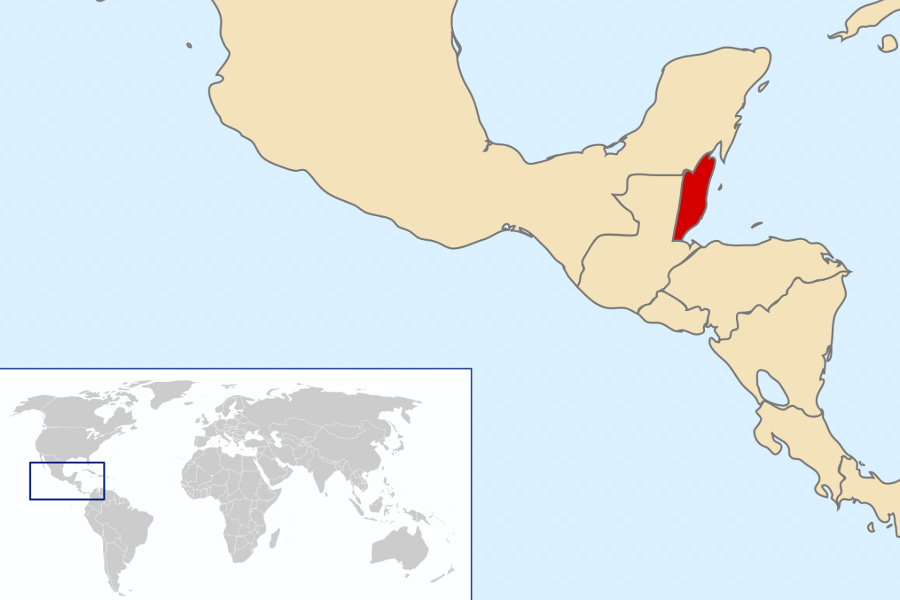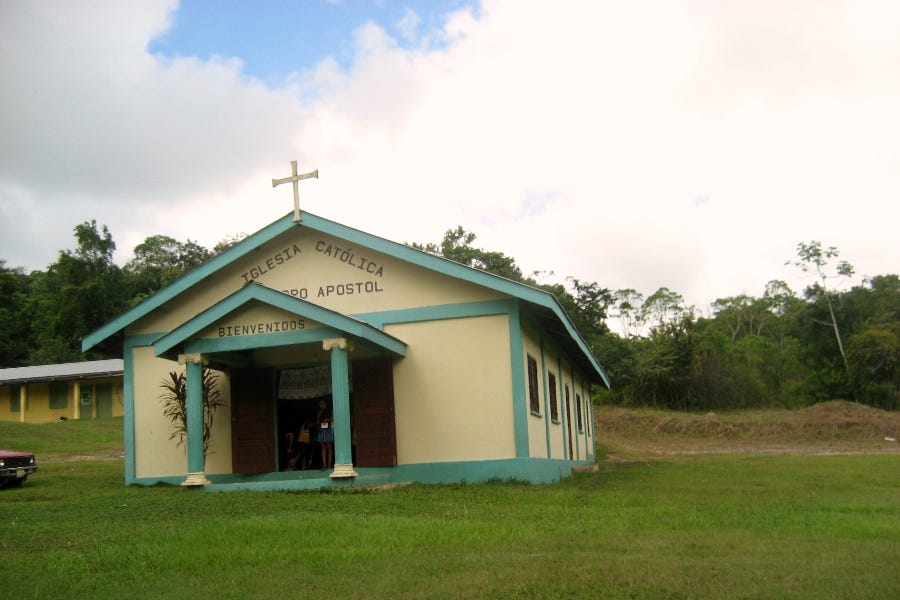
Belize awaits new bishop after puzzling resignation
The Church in the Central American nation is facing a transitional moment.
The Catholic diocese that covers the Central American nation of Belize saw the resignation of its only auxiliary bishop this week, two months after the death of the bishop who had guided it since 2017.

Pope Francis accepted the resignation March 13 of the Illinois-born Bishop Christopher Glancy, who had served as an auxiliary in the Diocese of Belize City-Belmopan since 2012.
Glancy, a member of the Clerics of Saint Viator (Viatorians), is 63 years of age, more than decade away from his 75th birthday, when bishops are expected to submit their resignations to the pope.
In line with its usual practice, the Vatican’s daily bulletin did not give a reason for the resignation.
Neither did a March 13 press release from the Belize City-Belmopan diocese, which said simply: “We give thanks to Almighty God for the years of service Bishop Glancy faithfully provided to the People of God in Belize. We wish him all the best and God’s endless blessings in his life. Let us keep him in our prayers.”
To add to the general air of mystery, Glancy left the diocese several years before his resignation was accepted.
So what happened?

A bishop’s journey
On May 5, 2012, Fr. Christopher Glancy was consecrated as an auxiliary bishop of the Belize City-Belmopan diocese, which serves roughly 166,000 Catholics out of a total population of around 400,000 people.
He was born in Moline, Illinois, in 1960. After graduating from Loyola University Chicago, he professed his first vows as a Viatorian. He taught for four years at a school in Bogotá, Colombia, becoming fluent in Spanish.
After taking his final vows as a Viatorian, he was ordained to the priesthood in 1993.
In 1997, Glancy and a fellow Viatorian priest opened a mission at St. Francis Xavier Parish, in Corozal Town, northern Belize. He served there until 2011, immersed in the life of the country that borders Mexico to the north, Guatemala to the west and south, and the Caribbean Sea to the east.
According to local media, Glancy was appointed as an auxiliary bishop in 2012 to assist Bishop Dorick Wright, who had led the diocese since 2006 but suffered from a series of major health problems, including kidney failure.
Speaking before his episcopal ordination, Glancy said: “I think it is an affirmation of me — and of the Viatorians — and of the good work we’ve been able to do in Belize.”
Wright resigned in 2017, at the age of 71, and was succeeded as the Bishop of Belize City-Belmopan by Bishop Lawrence Nicasio. Wright died three years later, in 2020.
Nicasio’s tenure was also marked by health difficulties. He underwent surgery in the U.S. in 2022. His office remained open under the supervision of three priests, including Fr. Jordan Gongora, who was named vicar general in 2023.
Nicasio died Jan. 1 this year, at the age of 67, after what the diocese said was an “extended and debilitating struggle with cancer.”
On Jan. 9, at the end of the bishop’s funeral Mass, it was announced that Fr. Gongora would serve as administrator of the Diocese of Belize City-Belmopan, governing the diocese until the appointment of a new bishop.

Life after Belize
A 2018 article on the Viatorians’ website described Glancy’s vocational journey and service in Belize.
Referring to his appointment as an auxiliary bishop, it said that Glancy had “served in that capacity for six years before the diocese named a Belizean priest as the new bishop” — perhaps a reference to the 2017 appointment of Bishop Nicasio, who was born in Dangriga, southern Belize.
“After five years, Bishop Glancy returned to the Viatorian Province Center [in Illinois], for renewal from his years of service in Belize,” the website said.
It quoted Glancy as saying: “I await the next adventure for this viator, this pilgrim following Christ along the way.”
While the chronology is a little confusing, this seems to date Glancy’s return to the U.S. to around 2017-2018, and suggest he was then in a transitional phase.
A local news report placed Glancy in Belize in March 2017, so presumably he left in the months after that.
This week, the Viatorians’ website reported that Glancy had presided at a March 9 Confirmation in Bourbonnais, Illinois, in a parish where he had served after his priestly ordination.
“Bishop Glancy has returned many times, including to confer the sacrament of confirmation during the pandemic,” it said.
He is currently listed as a case manager at a Viatorian-linked home in Illinois for young men seeking asylum in the U.S.
Abiding mystery
The Pillar understands that Glancy was a popular figure among the people and most clergy in Belize.
His departure from the country was regarded as abrupt. Although Belize’s Catholic community is close-knit and news is shared quickly, there is no consensus about why the bishop left.
Theories include a falling out with other Church figures or a Church-state matter, but they are unsubstantiated. Glancy does not appear to have addressed the reasons for his departure publicly. (The Pillar asked the bishop March 15 via email if he wished to comment, but had not received a reply by press time.)
Glancy did seem to raise eyebrows back in September 2016, when he led prayers at a ceremony marking Belize’s independence from the U.K. in 1981.
“For 35 years the people of Belize have elected numerous governments to act on our behalf and rule the nation,” he said, according to local media.
“Sometimes God of justice we have used our sovereign power to steal from the poor and the powerless. Those in power have fixed the scales and use the system to personal advantage, ultimately cheating the nation of its limited resources for the gain of a few.”
One media outlet described it as “a prayer that would have even made those thieves in the temple run for cover.”
Glancy is said to have returned once to Belize since his departure, for ordinations.
A new era in Belize
It’s not just the fact of Glancy’s resignation that is puzzling, but also its timing. Why did it come years after he had left the diocese?
One possibility is that its acceptance was connected to the death of Bishop Nicasio. Following Glancy’s resignation, the Diocese of Belize City-Belmopan is a blank slate in terms of bishops.
The path is clear for the Vatican to appoint new leadership to the diocese, which had 38 priests, 2 permanent deacons, 104 religious, and 13 parishes in 2022. The diocese has strong international links as it is a suffragan of the Archdiocese of Kingston in Jamaica and a member of the Antilles Episcopal Conference.
The Pillar understands that Archbishop Santiago De Wit Guzmán, the apostolic nuncio to Belize, is visiting the country. One of his tasks is presumably to begin drawing up a profile of the next bishop.
Belize’s Prime Minister John Briceño had intended to travel to Rome in January to meet with Pope Francis. But he was forced to cancel the trip amid protests by the country’s sugar cane farmers.
Perhaps the papal audience would have also provided an opportunity for a discussion of this important transition in the life of the Church in Belize.








Many Belizean priests have gone to Kenrick in St. Louis. They are very generous and holy priests! I'm praying that they find a good shepherd for their Church!